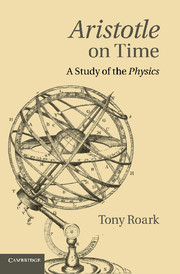Book contents
- Frontmatter
- Contents
- Preface
- List of figures
- List of abbreviations
- Introduction
- PART I TIMES NEW AND OLD
- PART II THE MATTER OF TIME: MOTION
- PART III THE FORM OF TIME: PERCEPTION
- PART IV SIMULTANEITY AND TEMPORAL PASSAGE
- 11 Simultaneity and other temporal relations
- 12 Temporal passage
- 13 Dissolving the puzzles of iv.10
- 14 Concluding summary and historical significance
- References
- Index locorum
- General index
13 - Dissolving the puzzles of iv.10
Published online by Cambridge University Press: 03 May 2011
- Frontmatter
- Contents
- Preface
- List of figures
- List of abbreviations
- Introduction
- PART I TIMES NEW AND OLD
- PART II THE MATTER OF TIME: MOTION
- PART III THE FORM OF TIME: PERCEPTION
- PART IV SIMULTANEITY AND TEMPORAL PASSAGE
- 11 Simultaneity and other temporal relations
- 12 Temporal passage
- 13 Dissolving the puzzles of iv.10
- 14 Concluding summary and historical significance
- References
- Index locorum
- General index
Summary
The time has come for me to make good on the promise I issued in the Introduction. As I understand these puzzles, their purpose is to cast doubt on the very existence of time and to problematize the status of the now, and I believe that Aristotle clearly takes them to be sophistical. There is in Physicsiv no explicit, systematic treatment of them (nor anywhere else in the corpus, for that matter). Indeed, immediately after rehearsing the puzzles, Aristotle forthrightly drops them and takes up the other principal question concerning time, namely its nature (218a30). This suggests to me that the puzzles are easily solved, or so Aristotle thinks, when one sees the mistaken conception of time on which they rest and replaces that mistaken conception with the proper concept. And this is in fact the case. Once we get the puzzles in view, it will not be difficult to understand why Aristotle didn't trouble himself to dismantle them, since they aren't really the obstacles they appear to be, but rather are for the most part mirages.
I recast the puzzles here in the form of three arguments, the second offered as a response to an implicit objection to the first:
Argument (1): Any part of time one cares to consider consists exclusively of the past, the future, or both. But neither the past nor the future is (since the past was, and the future will be). So there is no part of time that is. Hence, time doesn't exist.
[Implicit objection: argument (1) fails to consider as a part of time the present instant – the now – which certainly is.] […]
- Type
- Chapter
- Information
- Aristotle on TimeA Study of the Physics, pp. 211 - 215Publisher: Cambridge University PressPrint publication year: 2011

